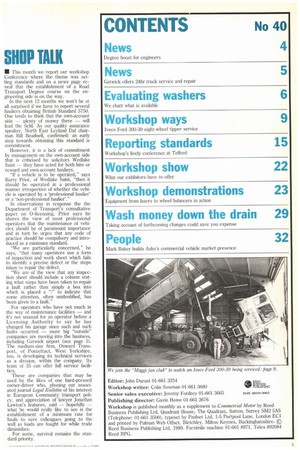SHOP TALK
Page 121

If you've noticed an error in this article please click here to report it so we can fix it.
• This month we report our workshop Conference where the theme was set ting standards and on a news page reveal that the establishment of a Road Transport Degree course on the engineering side is on the way.
In the next 12 months we won't be at all surprised if we have to report several hauliers obtaining British Standard 5750.
One tends to think that the own-account side — plenty of money there — will lead the field. As our quality assurance speaker, North East Leyland Daf chairman Bill Beadnell, confirmed: an early step towards obtaining this standard is commitment.
However, it is a lack of commitment by management on the own-account side that is criticised by solicitors Wedlake Saint — they have acted for both hire or reward and own-account hauliers.
"If a vehicle is to be operated," says Ban-y Prior, of Wedlake Saint, "then it should be operated in a professional manner irrespective of whether the vehicle is operated by a 'professional haulier' or a 'non-professional haulier)."
In observations in response the the Department of Transport's consultative paper on 0-licensing, Prior says he shares the view of most professional operators that the maintenance of vehi cles should be of paramount importance and in turn he urges that any code of practice should be compulsory and introduced as a minimum standard.
"We are particularly concerned," he says, "that many operators use a form of inspection and work sheet which fails to identify a precise defect or the steps taken to repair the defect.
"We are of the view that any inspection sheet should include a column stat ing what steps have been taken to repair a fault rather than simply a box into which is placed a "1" to indicate that some attention, often unidentified, has been given to a fault."
For operators who have not much in the way of maintenance facilities — and it's not unusual for an operator before a Licensing Authority to say he has changed his garage since such and such faults occurred — more big "outside" companies are moving into the business, including Gatwick airport (see page 5).
The medium-size firm, Onward Trans port, of Pontefract, West Yorkshire, too, is developing its technical services as a division, within the company. Its team of 35 can offer full service facilities.
These are companies that may be used by the likes of one hard-pressed owner-driver who, phoning our associ
ated journal Legal Bulletin of his interest in European Community transport poli
cy, and appreciation of lawyer Jonathan Lawton's features, said — hopefully — what he would really like to see is the establishment of a minimum rate for hauls to save colleagues going to the wall as loads are fought for while trade diminishes.
For some, survival remains the standard priority.


























































































































































